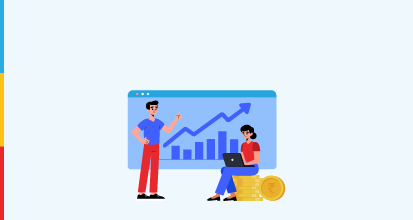Written by : Knowledge CentreTeam
2025-12-17
1677 Views
8 minutes read
Share
Employment provides regular compensation, more commonly called ‘income from salary’. For most professionals, salary is one of the most basic motivations driving the relationship between the workforce and employers. In fact, it is one of the primary sources of financial security. However, when you go beyond its informal understanding, your salary income forms a part of a valid, legally recognised contract between you as an employee and your employer.
Understanding how salary works becomes essential because every component, from basic pay to allowances and deductions, influences your final take-home pay. In this blog, let's learn more about what income from salary means, how it is calculated, and the allowances commonly included in a salary package.
Key Takeaways
|
Salary means the money received by a person, referred to as an “employee”, from an organisation, referred to as an “employer”, for offering specific services in connection with employment. Your salary slip details all the components of your income, including allowances. To understand how these allowances are calculated, you can refer to your company's policies or consult your HR department.
As per Section 17(1) of the Income Tax Act, 1961, salary includes any payment received by the employee in cash, or in the form of a facility. It is one of the primary sources of taxable income for individuals and is taxed under the head income from salary in the Income Tax Act.
The scope of income from salary extends beyond just the monthly salary credited to an employee’s account. It includes:
An OTP has been sent to your mobile number

Sorry ! No records Found
Thank You for submitting the response, will get back with you.
If you are a salaried person, the total expense incurred by your employer to avail your services for a year is called Cost to Company (CTC). This includes a basic salary, allowances, perquisites, a performance-linked variable component, health insurance, provident fund, gratuity, etc. The CTC is different from salary income. Income from salary is the net income that you take home.
The income from salary in Income Tax is simple to understand when you know its components. Salary is made up of different elements that together form your total taxable income, and understanding each part helps you know exactly how your earnings are assessed for tax. The following are some of the essential components of your salary that make up your taxable income:
A quick review of your tax deductions helps you confirm that everything matches your records before filing your return. The following are two ITR filing forms that help you understand the same clearly:
Form 16: Issued by your employer, it is a statement mentioning salary income and certifying that taxes have been deducted from your salary income. When you receive your Form 16, check whether your PAN is mentioned correctly so that the TDS reflects against your PAN in the income tax records.
26AS: You may log in to either the TRACES website or your income tax filing account to check your 26AS Form or Annual Information Statement. You must validate whether the deducted amount has been deposited with the government.
There are a plethora of options for you to save taxes if you earn income from a salary. With the right mix of investments and planning, you can lower your taxable income while building long-term financial security.
You may consider a few of the options listed below:
Also Read - Is Pension Taxable?
Employers often provide various perks and benefits to employees in addition to their basic salary. These perks, also known as perquisites, can be monetary or non-monetary in nature. While some of these perks are fully taxable, others are partially taxable or completely exempt from tax under Rule 3 of the Income Tax Act of 1961. Understanding the tax implications of these benefits can help employees plan their finances efficiently.
| Taxable Perks | Exempt Perks |
|---|---|
|
|
|
|
|
|
|
|
|
|
|
|
Retirement benefits also form part of your income from salary. They help you meet your post-retirement needs and live a comfortable life. While these benefits provide financial support, their taxability varies based on the nature of the benefit and employment type. Let’s discuss the tax implications of key retirement benefits:
| Uncommuted Pension | Commuted Pension |
|---|---|
| Fully taxable | For government employees: Fully exempt |
For non-government employees If gratuity is received: One-third of the pension is exempt.
|
| Government employees | Non-government employees (covered under the Payment of Gratuity Act) | Non-government employees (covered under the Payment of Gratuity Act) |
|---|---|---|
| Fully exempt | The least of the following is exempt:
| The least of the following is exempt:
|
| Government employees | Non-government employees |
|---|---|
| Fully exempt | Exempt up to the least of the following:
|
Filing your Income Tax Return (ITR) as a salaried individual is an easy process if you follow the right steps and have all the necessary documents in place. Here’s a step-by-step guide to help you file your salary-based ITR efficiently:
Before starting the ITR filing process, ensure you have all the necessary documents ready. The list of required documents is given later in this article.
ITR-1 (Sahaj) is suitable for salaried individuals with income up to ₹50 lakh, including income from house property and interest. However, if you have capital gains, multiple properties, or foreign income, you must file ITR-2 instead.
Visit the official Income Tax e-Filing Portal at https://www.incometax.gov.in
Log in using your PAN/Aadhaar and password
Navigate to the “File Income Tax Return” section
Select the appropriate Assessment Year
Choose the ITR form applicable to you
The e-filing portal allows you to auto-fill details based on your Form 16 and Form 26AS. Verify that all details, such as salary income, TDS deducted, and employer details, are correctly captured. You can also claim the relevant deductions.
The government provides two tax regimes: the Old Tax Regime and the New Tax Regime. The Old Tax Regime allows you to claim deductions under 80C, 80D, HRA, and more. The New Tax Regime offers lower slab rates but does not permit any deductions or exemptions. It is advisable to compare both regimes and choose the one that minimises your tax liability.
Once all deductions and exemptions are applied, your tax liability is computed. If TDS deducted by your employer covers your tax dues, you do not need to make any additional payments. However, if there is an additional amount payable, you can pay it online using Challan 280 on the Income Tax portal. If excess tax has been deducted, the system will automatically calculate a refund, which will be processed after filing.
After finalising all the details, proceed to submit your ITR. To complete the process, you must e-verify your return using Aadhaar OTP, Net Banking, or an Electronic Verification Code (EVC).
As the first step in the return filing process is to gather documents, you should familiarise yourself with all the relevant ones as per tax laws:
Form 16: It is issued by your employer and contains salary details and TDS deducted.
Form 26AS: This form, which shows all tax credits and TDS deposited by your employer, is available on the income tax e-filing portal.
You must have salary slips for the financial year as they help tax authorities verify allowances, deductions, and total salary.
PF Passbook: If you contribute to a Provident Fund (PF), keeping your PF passbook handy is useful for claiming exemptions.
The Annual Information Statement (AIS) is also required. It is a detailed record of all your financial transactions reported to the Income Tax Department, helping you verify your income and accurately determine your tax obligations.
PAN and Aadhaar cards are also required for identity verification purposes.
Income from salary refers to the earnings people receive from their employment/job, including wages, bonuses, and other perks. The calculation of this income typically involves assessing various allowances and deductions. Allowances can include basic pay, house rent allowance (HRA), and other benefits provided by the employer. Calculating income from salary involves factoring in these allowances along with any deductions, such as contributions to provident funds or taxes. Understanding these components is essential for individuals to manage their finances and plan for taxes effectively.
Salary consists of base pay or earnings, any pension or annuity, gratuity, advance pay, encashment of paid time off, allowances, and perks.
An exemption is a certain sum that is subtracted from the gross wage of salaried individuals before computing income tax. You qualify for an income tax deduction under sections 10 and 54 if you are a salaried employee.
According to Section 14 of the Income Tax Act of 1961, income can be categorised into five categories:
The three most common types of income are:
Income is the amount you receive for providing services and is not limited to a fixed sum or cash payment. It can include commissions, dividends, tips, salary, and other forms of earnings. Whether received in cash, credit, or through barter, income represents the value of your work or services.
Some allowances are fully or partially exempt from tax, depending on eligibility. Common examples include house rent allowance, leave travel allowance, children's education allowance, and transport allowance. The exemption varies based on actual expenses, salary structure, and statutory limits.
HRA exemption is based on the lowest of the following three amounts: the actual HRA received from the employer, the rent paid minus 10% of basic salary, or 50% of basic salary for metro cities and 40% for non-metro cities. The final exempt amount depends on your salary, rent, and city of residence.
Perquisites are non-cash benefits provided by an employer, such as rent-free accommodation, company cars, concessional loans, or paid utilities. These benefits are assigned a monetary value as per income tax rules and added to the employee’s taxable salary. Some perquisites are taxable, while a few are exempt or taxed only partially.
Retirement benefits like pension, gratuity, leave encashment, and VRS payouts are part of salary income, with exemptions varying by benefit type, employee category, service years, and statutory limits.
Under Section 16, salaried employees can claim three types of deductions:
A standard deduction of up to ₹50,000 (or the actual salary if lower).
There’s also a deduction for the entertainment allowance only for government employees. It applies when the deductible amount is the lesser of ₹5,000, 20% of the basic salary, or the actual allowance.
A deduction for professional tax paid to the state government, fully allowable if actually paid.
The standard deduction of ₹50,000 is offered under the old tax regime. Under the new tax regime, only the standard deduction of ₹75,000 is available.
Disclaimer - This article is issued in the general public interest and meant for general information purposes only. The views expressed in this blog are solely those of the writer and do not necessarily reflect the official policy or position of Canara HSBC Life Insurance Company Limited or any affiliated entity. We make no representations or warranties of any kind, express or implied, about the completeness, accuracy, reliability, suitability, or availability with respect to the blog or the information, products, services, or related graphics contained in the blog for any purpose. Any reliance you place on such information is therefore strictly at your own risk. You should consult with a qualified professional regarding your specific circumstances before taking any action based on the content provided herein.









We bring you a collection of popular Canara HSBC life insurance plans. Forget the dusty brochures and endless offline visits! Dive into the features of our top-selling online insurance plans and buy the one that meets your goals and requirements. You and your wallet will be thankful in the future as we brighten up your financial future with these plans.